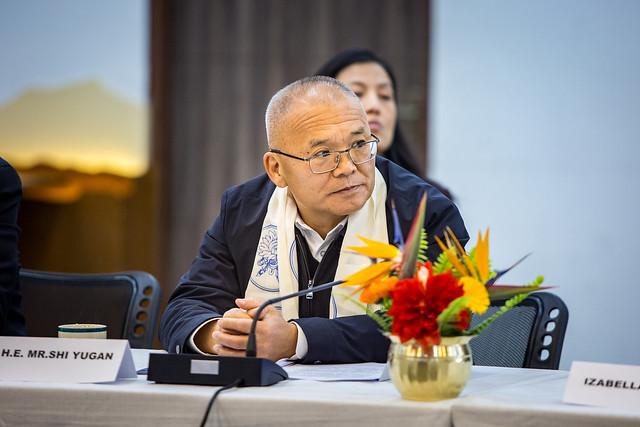Just a decade ago, it would have been difficult to imagine such a solemn ritual to honour the glacier, to lament the loss of much of its ice. Yet the changes are undeniable. Yala Glacier is disappearing.
The meeting, chaired by Izabella Koziell, Deputy Director General, ICIMOD, set out to identify areas of mutual interest and complementarity.

During the visit, the partnership between ICIMOD and the Kunming Institute of Botany (KIB), Chinese Academy of Sciences (CAS) was formalised through a Memorandum of Understanding (MoU).

This collaboration cements the partnership between the Honghe Center for Mountain Futures and ICIMOD. KIB has been one of the lead Chinese institutions cooperating with ICIMOD for the implementation of transboundary landscape programmes across the HKH in the past decades, and has been also actively involved in contributing to and shaping ICIMOD Strategy 2023: Moving Mountains, and the fifth Medium Term Action Plan (MTAP-V).
During the visit to the LML, Dr Surendra Joshi, Senior Resilient Livelihoods Specialist from ICIMOD introduced salient features of Living Mountain Lab, ICIMOD’s demonstration site, while Dr Shen Ting, Deputy Director of the Honghe Centre for Mountain Futures, KIB highlighted the key areas of collaboration between the two institutions through Mountain Futures, a global initiative that aims to promote the well-being of people in the mountains, restore and protect ecosystems, and learn and share green development solutions.

Photo: Jitendra Raj Bajracharya/ICIMOD
Under this partnership, the two institutions have agreed to collaborate in the following areas:
- Joint research in the areas of biodiversity conservation, ecosystem restoration, social-ecological resilience of mountain ecosystems and people, and climate-resilient agriculture,
- Regional cooperation to promote evidence-based policies and practical solutions, and promotion of knowledge exchange across the region,
- Building capacities of researchers and scholars for environmental leadership,
- Exchange and technology transfer between the Honghe Centre for Mountain Futures and the Living Mountain Lab,
- Joint events of mutual interest and contribution to proposal developments

Functioning as the designated administrative body under the auspices of the Chinese government, the Chinese Academy of Sciences (CAS) formally established the China Committee for the International Centre for Integrated Mountain Development (CNICIMOD) on October 20, 2006. This committee, comprising a secretariat and five regional offices, operates in strict adherence to the principles and objectives set forth by ICIMOD.
ICIMOD also has a privilege of being the founding institutional member of the China-led Alliance of International Science Organizations (ANSO). ANSO, a non-profit, non-governmental international scientific organization from China, was founded in 2018 by the CAS in collaboration with 36 other esteemed international science and education institutions worldwide. This underscores the pivotal role of ICIMOD-CAS partnership in fostering collaboration and advancing scientific endeavours on a global scale through ANSO.
KIB, CAS has been actively engaged in research and collaborative efforts with ICIMOD since its inception. The collaboration has witnessed a continuum of contributions, starting from the representation of esteemed researchers such as Professor Pei Shengji and Xu Jianchu on behalf of the Chinese government and CAS. This commitment has evolved into full-time engagement with ICIMOD, resulting in extensive and impactful scientific achievements in areas such as climate change adaptation, biodiversity assessment, and conservation.
The Mountain Lab that’s living: Trajectory and goals lying ahead
The Living Mountain Lab, formerly known as the ICIMOD Knowledge Park at Godavari, has refined its applied role to complement and execute ICIMOD's theoretical and field-based research. It stands as a pivotal hub, spotlighting sustainable agricultural technologies and distinctive ecological circular farming practices within the HKH region.
Committed to developing straightforward, impactful, and cost-effective solutions, this demonstration-based facility aims to propel sustainable development for mountain communities, addressing challenges posed by climate and environmental shifts. Annually, the lab draws in nearly ten thousand farmers, students, technicians, and government officials from Nepal and other nations for educational purposes.

The collaboration between ICIMOD and the Yunnan Provincial Government has seen a continued strengthening of the partnership between KIB and ICIMOD. The advantages from the Chinese side are notable, as they bring expertise in accelerating research on the ecological management of plateau mountain regions, fostering innovative development of distinctive germplasm resources, and promoting sustainable growth in mountain agriculture. The collaboration aspires to establish a research consortium focused on advancing eco-friendly mountain agriculture in the unique plateaus of South Asia and Southeast Asia. This initiative includes the creation of specialized agricultural demonstration parks tailored to plateau conditions and the development of international cooperation platforms.

Through extensive sharing and promotion of the successful practices in Yunnan's plateau-specific agriculture and those of our regional member countries in the HKH, this collaboration aims to substantially contribute to amplifying ICIMOD's influence in the region and the broader field of mountain agriculture.
Conclusion
In the last six months, the Living Mountain Lab has effectively drawn the interest of numerous new and old partners from China who are keen to engage in discussions regarding specific collaboration approaches. Notable among them are esteemed national research institutions like the KIB and the Sichuan Academy of Agricultural Sciences.
The Living Mountain Lab serves as a regional Hub to co-innovate and foster exchange of innovations in the region, building on knowledge and evidence on climate change impacts as well as well as larger socio-economic and environmental impacts on human health, food production systems, and biodiversity in the HKH.
The solutions tested and demonstrated in the LML include not only technologies but also innovations in process, functions, and business models that are essential to help reduce the current and long-term impacts of climate and socio-economic changes.
The formalization of this partnership represents a crucial milestone in the enduring and collaborative journey between the two parties.





